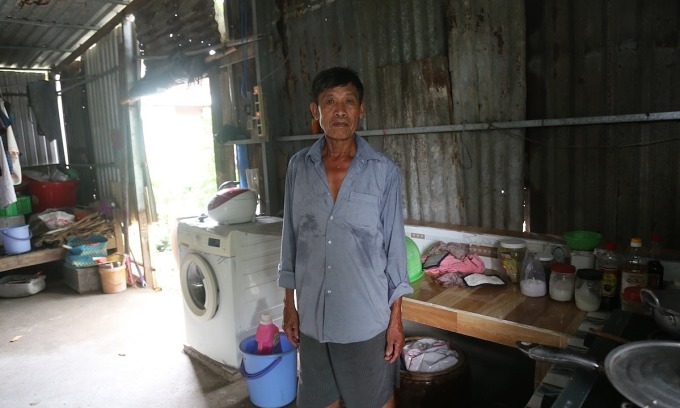Thousands in limbo as Singapore-owned project acquired by Truong My Lan stalled for decades
One warm day in October Dang Van Sau was sitting in his stifling house. With a corrugated iron roof and walls, it is situated on his 200-square-meter plot of land on Mai Ba Huong Street in the city’s Binh Chanh District.
The land has been earmarked for acquisition for the Sing-Viet urban project, preventing him from building a proper house.
For almost 30 years his 70-square-meter house has remained temporarily patched, affecting the daily life of his five family members.
Sau, 64, says he inherited the land from his parents.
In 1997 it was included in the urban project, which was planned as a self-contained residential area. But no progress has been made on the project, leaving his family in limbo, unable to build a proper house since the law prohibits any development.
Dang Van Sau stands inside his makeshift house in Binh Chanh District, HCMC, October 2024. Photo by Read/Dinh Van |
In 2018 the investor offered him compensation of VND139.7 million (US$5,520) for the land. Sau believed the offer was too low considering its prime location on a main road, and has filed multiple complaints in vain.
If he accepts the compensation, his family will be forced to rent since the amount is insufficient to buy a new home. He is a construction worker and his wife works at a restaurant, and their incomes are not enough to save much money.
Sau laments: “For decades we have lived in this makeshift home, unable to build a proper house. Now the compensation is too low for us to find a new place to live.”
Huynh Thi Be, 71, whose 60-square-meter house is also affected by the project, has been living in difficult conditions with her four family members for decades.
Her single-story house, bought with a handwritten deed in 1999, which means an informal agreement between the seller and buyer that lacks an officially approved land ownership license from the authorities, remains unchanged due to its inclusion in the clearance zone. The house is damp and leaks during rain, but only minor repairs are allowed.
Each time she wants to fix something, she must seek permission from local authorities, who only permit temporary repairs to the roof and wooden walls.
Years ago she was offered VND70 million in compensation.
“It’s not enough to do anything,” Be says, expressing her frustration.
Some neighbors did accept the offer of compensation and agreed to relocate, but six years later are yet to see any money.
 |
Huynh Thi Be stands by her family’s makeshift house in HCMC, October 2024. Photo by Read/Dinh Van |
Sau and Be’s families are among nearly 700 affected by the Sing-Viet urban project. While 366 people have handed over their lands, the remaining are embroiled in legal disputes over compensation.
Launched in 1997 the $300-million Sing-Viet was envisioned as a high-end urban area spanning 331 hectares, with a horse racing track, golf course, schools, parks, apartments, and villas for 60,000 occupants.
But it remains an expanse of vacant land dotted with rundown houses, delayed due to the legal and compensation challenges and further complicated by the criminal cases against Truong My Lan.
The original developer was Sing Viet Urban Development Co. Ltd, owned by Singapore’s Amaland Pte. Ltd.
Truong My Lan later acquired 100% of the company’s shares, but the ownership transfer remains unresolved, with legal issues surrounding it persisting.
Lan, 68, was sentenced to life imprisonment last week for fraudulent appropriation of assets, money laundering, and illegal cross-border money transfers.
In April she had been sentenced to death for embezzling VND677 trillion ($27 billion) from Saigon Commercial Bank.
At a meeting with lawmakers in Binh Chanh District on Oct. 1, many affected people expressed frustration at the fact that they could not do business or make repairs to their homes.
The local infrastructure has also deteriorated in the absence of investment, leading to further hardship.
For nearly a decade locals and National Assembly representatives have raised these concerns, but a resolution has evaded them.
 |
The current state of the area designated to become the Sing-Viet urban project. Photo by Read/Dinh Van |
Tran Ngoc Vu, deputy director of the Binh Chanh compensation and site clearance department, says the district is working with local authorities to allow residents to make temporary repairs while waiting for the project’s revival.
Asked about the complaints about low compensation, Vu says more than 120 households have been living on public agricultural lands on Mai Ba Huong Street without proper ownership documents.
Many bought the lands through handwritten agreements and built homes without permission, he says.
The local administration has petitioned that the city to review each case and provide support measures that protect residents’ interests, he says.
The city will instruct the project’s investor to provide a land swap, allowing residents to exchange their existing land for plots in the project’s resettlement area at prices that are set below market value, to ensure that affected residents can relocate without facing financial hardships or having to pay the higher prices associated with commercial real estate.
“This will help affected residents settle and rebuild their lives,” Vu adds.


Comments are closed.